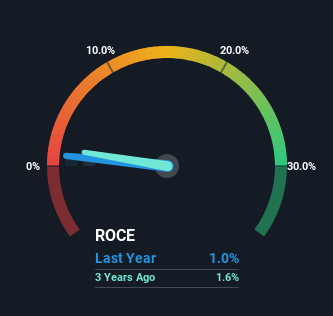Taiwan Fertilizer (TWSE:1722) May Have Issues Allocating Its Capital
If we're looking to avoid a business that is in decline, what are the trends that can warn us ahead of time? Businesses in decline often have two underlying trends, firstly, a declining return on capital employed (ROCE) and a declining base of capital employed. Ultimately this means that the company is earning less per dollar invested and on top of that, it's shrinking its base of capital employed. Having said that, after a brief look, Taiwan Fertilizer (TWSE:1722) we aren't filled with optimism, but let's investigate further.
Understanding Return On Capital Employed (ROCE)
For those who don't know, ROCE is a measure of a company's yearly pre-tax profit (its return), relative to the capital employed in the business. To calculate this metric for Taiwan Fertilizer, this is the formula:
Return on Capital Employed = Earnings Before Interest and Tax (EBIT) ÷ (Total Assets - Current Liabilities)
0.0096 = NT$745m ÷ (NT$83b - NT$5.2b) (Based on the trailing twelve months to June 2024).
Thus, Taiwan Fertilizer has an ROCE of 1.0%. Ultimately, that's a low return and it under-performs the Chemicals industry average of 5.6%.
View our latest analysis for Taiwan Fertilizer

While the past is not representative of the future, it can be helpful to know how a company has performed historically, which is why we have this chart above. If you're interested in investigating Taiwan Fertilizer's past further, check out this free graph covering Taiwan Fertilizer's past earnings, revenue and cash flow.
What Can We Tell From Taiwan Fertilizer's ROCE Trend?
In terms of Taiwan Fertilizer's historical ROCE movements, the trend doesn't inspire confidence. About five years ago, returns on capital were 1.8%, however they're now substantially lower than that as we saw above. Meanwhile, capital employed in the business has stayed roughly the flat over the period. Companies that exhibit these attributes tend to not be shrinking, but they can be mature and facing pressure on their margins from competition. So because these trends aren't typically conducive to creating a multi-bagger, we wouldn't hold our breath on Taiwan Fertilizer becoming one if things continue as they have.
The Bottom Line On Taiwan Fertilizer's ROCE
In summary, it's unfortunate that Taiwan Fertilizer is generating lower returns from the same amount of capital. But investors must be expecting an improvement of sorts because over the last five yearsthe stock has delivered a respectable 42% return. In any case, the current underlying trends don't bode well for long term performance so unless they reverse, we'd start looking elsewhere.
Like most companies, Taiwan Fertilizer does come with some risks, and we've found 2 warning signs that you should be aware of.
While Taiwan Fertilizer isn't earning the highest return, check out this free list of companies that are earning high returns on equity with solid balance sheets.
Valuation is complex, but we're here to simplify it.
Discover if Taiwan Fertilizer might be undervalued or overvalued with our detailed analysis, featuring fair value estimates, potential risks, dividends, insider trades, and its financial condition.
Access Free AnalysisHave feedback on this article? Concerned about the content? Get in touch with us directly. Alternatively, email editorial-team (at) simplywallst.com.
This article by Simply Wall St is general in nature. We provide commentary based on historical data and analyst forecasts only using an unbiased methodology and our articles are not intended to be financial advice. It does not constitute a recommendation to buy or sell any stock, and does not take account of your objectives, or your financial situation. We aim to bring you long-term focused analysis driven by fundamental data. Note that our analysis may not factor in the latest price-sensitive company announcements or qualitative material. Simply Wall St has no position in any stocks mentioned.
About TWSE:1722
Taiwan Fertilizer
Manufactures and sells inorganic and organic fertilizers, and other chemical products in Taiwan and internationally.
Adequate balance sheet with very low risk.
Similar Companies
Market Insights
Community Narratives



